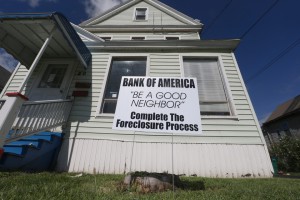Shaming Banks to Quicken the Foreclosure Process
Foreclosure can damage your credit beyond repair and leave you without a home. As much as you dread foreclosure, if you fall behind on your payments, you want it to happen quickly. Why? When homeowners receive notice of foreclosure but before the sale is complete, the homeowner is stuck in limbo. Property taxes and missed mortgage payments pile up, and your credit is damaged the longer foreclosure takes.
This is what happened to one woman in Buffalo, New York. After falling ill and being no longer able to care for her house, she decided to let the bank foreclose so she could recoup some funds. Her lawyer believed the process would take only six months, but it ended up taking seven years. To help speed up the process, she teamed with her Assemblymember and started a “Shame Campaign” to publicly humiliate banks into speeding up the foreclosure process. They posted hundreds of signs in the Buffalo area that said, “Shame on you, [insert bank name here], for not completing the foreclosure process.” And it worked. After three months of the “Shame Campaign,” the bank finally finished the foreclosure process – that is, after seven years and three months.
With debtors going through such extreme measures to finalize foreclosures on their homes, it begs the question: can banks legally delay foreclosures to the detriment of the debtor?
Delaying Foreclosure
Many mortgage lenders are hesitant to complete their foreclosure actions, and they have plenty of reasons. As long as the properties are not foreclosed, they are still listed as an asset instead of bad debt on the banks’ books. Banks do this with an eye to the future: as long as the property is listed as an asset, the bank is viewed more favorably should it merge or be acquired by another company. 
There are also a lot of costs associated with foreclosure. A bank may be reluctant to foreclose because they don’t want to pay the attorney’s fees and costs required to foreclose. There are also costs to rehabilitate and repair the property if the previous delinquent owners gutted the property. The bank may also not want to take title to the property as it would have to pay for property preservation and other costs of the property. In other words, the bank would have to pay insurance, taxes and electric bills. The bank would also have to pay for the cost of evicting any holdover tenant, which can be both messy and costly.
As a result, banks may decide not to foreclose, even after they’ve initiated proceedings. Whereas suspected criminals have a constitutional right to a “speedy trial,” there is nothing that legally requires banks to foreclosure quickly. Banks can delay foreclosure as long as they want to postpone the host of costs associated with foreclosure. Shaming banks into completing foreclosures may be the only way to expedite the process.
Zombie Title
In addition to delaying foreclosure, banks may also initiate foreclosure proceedings by issuing a notice of foreclosure, then unexpectedly dismiss the foreclosure. This is known as “Zombie Title.” Zombie title is known as a right to ownership and possession of a home that remains with the debtor who believes he or she has lost the property as a result of foreclosure.
It seems inconceivable that banks can decide not to foreclose after starting the foreclosure process, but it happens more often that you would think. They often occur in low-income areas where the lender does not want to assume responsibility for the upkeep of the property and wants to save money on property taxes. If squatters occupy the property or it falls into extreme disrepair, the bank may wash its hands of the property altogether.
States with the highest numbers of zombie properties include New Jersey, New York, Florida and Illinois. These states have a high number of foreclosures because of the long foreclosure process in those states. Since the process takes so long, owners tend to abandon their property.
Since title remains in the homeowner’s name, the homeowner is legally obligated to pay debts and expenses like property taxes, maintenance on the property, and HOA dues. A homeowner may not receive notice that the bank decided to stop the foreclosure process. As a result, debts associated with the property can come back to haunt homeowners who have no idea that they are still on title and are obligated to pay such expenses.


Comments